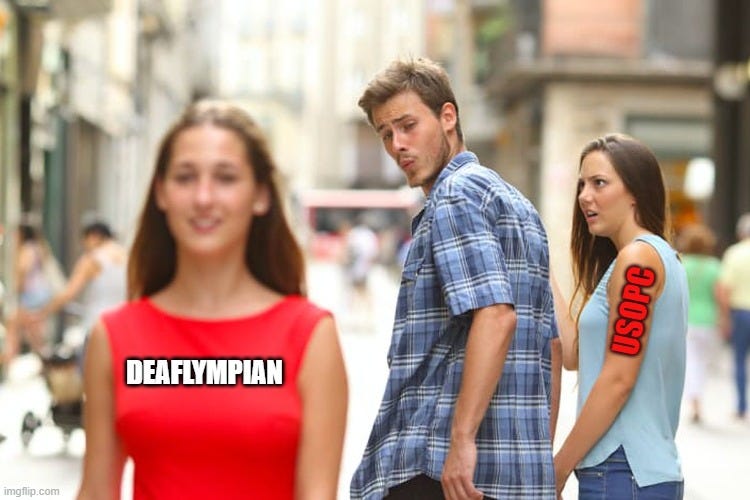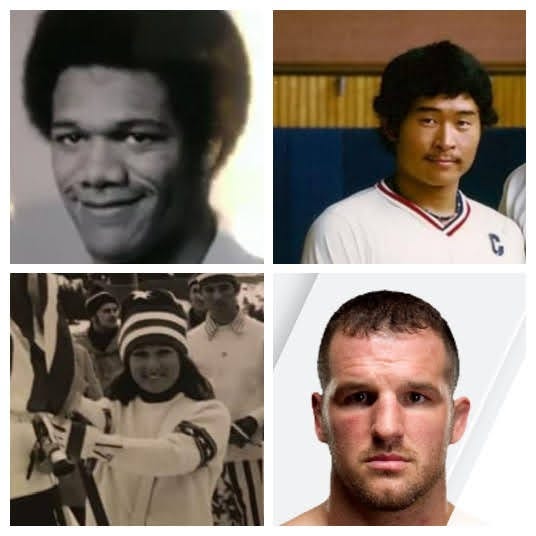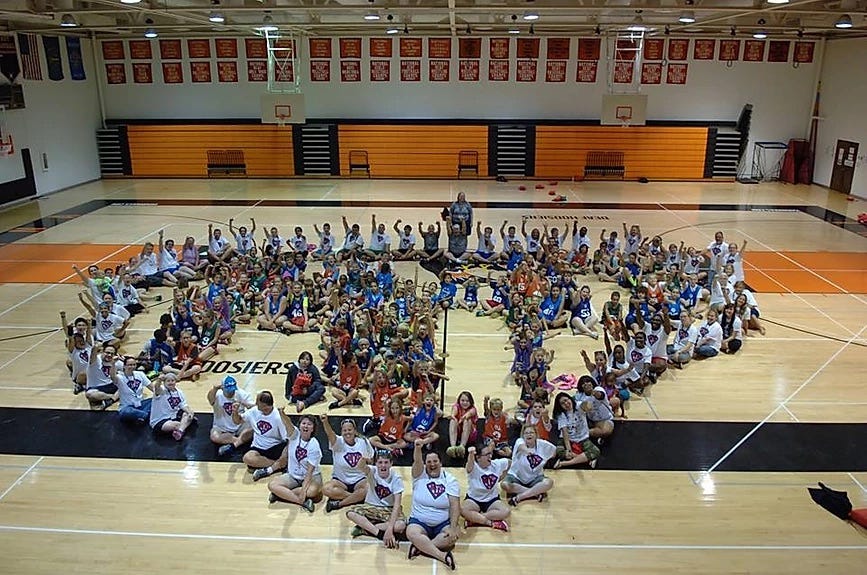Jeff Mansfield, the President of the USA Deaf Sports Federation, told the Commission on the State of U.S. Olympics and Paralympics (CSUSOP) on September 6 that the Ted Stevens Olympic and Amateur Sports Act of 1998 did not allow exceptional support for deaf athletes. The current USOPC alignment with the International Paralympic Committee has left deaf athletes – who participate in a separate multi-sport event, the Deaflympics – on their own, especially compared to Paralympians supported by the USOPC. He asked for an amendment to the Act to require the USOPC to assist deaf athletes similarly.
William R. Schyman, Jr earned a gold medal in the men’s basketball event in the 1965 World Games for the Deaf (renamed Deaflympics in 2001) in Washington, DC. Earlier in 1953, he was the first deaf person to be drafted into the National Basketball Association (NBA) being drafted by the Baltimore Bullets. Click the link to read the rest of his story.
Jeff Float collected ten medals in the swimming events at the 1977 World Games for the Deaf and became the first legally deaf athlete from the United States to win an Olympic gold medal by earning it in men's 4×200-meter freestyle relay in the 1984 Olympics. Click the USOPC link about Float.
Janel Birrenkott collected three gold medals in the women’s basketball event in three Deaflympics: Sofia in 1993, Copenhagen in 1997, and Rome in 2001. in 1986, she was the first deaf person to play in the National Women’s Basketball Association (NWBA) with the Pride of Iowa team. Click the link about her.
Justina Miles received a silver medal in the women's 4×100 running relay in the 2022 Games in Caxias do Sul, Brazil. Standing next to Rihanna during the 2023 Super Bowl halftime show, she wooed the stadium audience and streaming television viewers with her ultra-beautiful American Sign Language performance interpreting Rihanna's singing. Click the CNBC story about her.
Tammy Marcinuk won five gold medals, one silver medal, and three bronze medals in the skiing events at the Winter World Games of the Deaf for over 24 years, starting in 1967. She taught deaf high school students in St. Croix, Cleary School for the Deaf in Smithtown, NY, and non-deaf college students at Mount Wachusett Community College. Click her obituary.
Gary Washington was the proud owner of four medals in two Games: Gold in the 200m sprint event, Silver in the 100m sprint event, Gold in the 4X100m running relay in 1973, and Gold in the men’s basketball event in 1977. He went on to play running back and defensive back for the University of Colorado Buffaloes. He went to the White House in 1973 to visit with President Richard Nixon. Click a good story about Gary.
Matt Hamill became well-known to the fans of the Ultimate Fighting Championships after winning four medals in the wrestling events: two Golds in the 1997 World Games for the Deaf and one Gold and one Silver in the 2001 Deaflympics. In 2011, his life story was made into a film called “The Hammer.” He was inducted into the National Wrestling Hall of Fame in 2013. Click the latter’s article about Matt.
Ken Murashige competed in three Summer Deaflympics (1973, 1977, and 1981) and five Winter Deaflympics (1975, 1979, 1983, 1987, and 1991). He had not yet gotten any medals, but his volleyball team received the 4th place three times. Try to read a book about Ken.
More Deaflympians are featured in my previous issues:
Big Brother's Deaflympian Matt Klotz's Censored/Blurred Tattoo
(Lindsey Dolich Felt)) in A 'LEGITIMATE'’ Global Tournament
Of course, there are more Deaflympians, but the Substack has limited the number of words for publishing this issue. So I, as an advocate of the Deaflympian’s Rights, will write more in my future issues.
“I am more tuned in to the problems of the deaf now where I had not thought about them before. Deaf people are not really handicapped but are normally healthy people who have been prevented from having the opportunities hearing people have. Some of these deaf athletes are definitely of Olympic caliber and could have a chance if they had the advantages of better training facilities and coaches at all levels that hearing children get, “ then Athletic Trainer at Miami University of Ohio Ken Wolfert told the Ohio University Alumnus Magazine in 1978. “My work as a trainer in the 1977 Games in Bucharest, Romania was the same as it is with the Miami football and basketball teams except the training room was so quiet because the athletes were communicating by sign language.”
Should the Commission of the State of U.S. Olympics and Paralympics agree with Wolfer’s claim that Deaflympians are Olympic-caliber?
~~~~~~~~~~~~~~~~~~~~~~~~~~~~~~~~~~~~~~~~~~~~~~~~~~~~~~
These deaf youths participated in the Deaf Youth Sports Festival at Kentucky School for the Deaf last July.
NOTE: This festival was initially called Mini Deaf Olympics and was later renamed The Deaf Youth Sports Festival because of the trademark provision of the Amateur Sports Act of 1978.
Will some of these youths receive USOPC funds for their training expenses for the future Deaflympics? The decision is up to 14 CSUSOP Commissioners.







